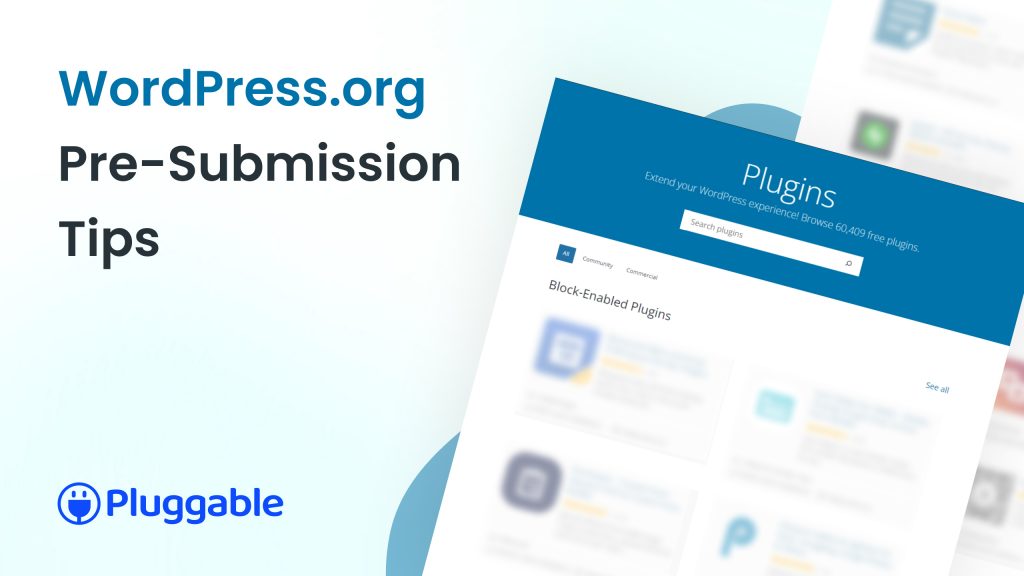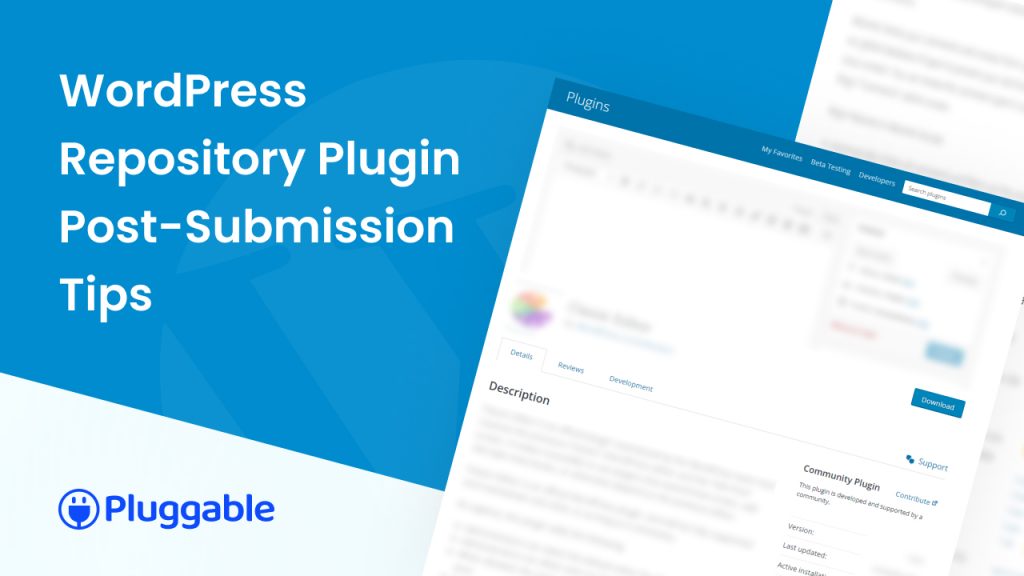If you’re a WordPress developer, you’re likely no stranger to the world of plugins. These invaluable extensions can enhance the functionality of WordPress websites, making them more versatile and powerful. Whether you’re a seasoned developer or just starting on your plugin development journey, you should consider submitting a plugin to the WordPress repository to share your creations with the global WordPress community.
Before submitting a plugin to the WordPress repository, there are crucial considerations that can significantly impact your success and the experience of users who will install and use your plugin. In this blog post, we’ll delve into the 12 important things you should carefully consider before hitting that “Submit” button.
From code quality and security to user-friendliness and compatibility, we’ll explore the key factors that will help you make your plugin stand out in the competitive WordPress ecosystem. So, whether you’re about to launch your first plugin on wordpress.org or want to improve your existing ones, let’s dive into the essentials you need to know before submitting a plugin to the WordPress repository.
Factors to consider before submitting a plugin to the WordPress repository

1. Code Quality and Security
Code Quality and Security are the twin pillars upon which a successful WordPress plugin stands. Code quality involves writing clean, well-structured, and maintainable code by following WordPress coding standards. It makes your WordPress plugin easy to understand for other developers. Also, this reduces the likelihood of getting bugs and enhances overall performance.
Security involves safeguarding your WordPress plugin and the websites it will be installed on. Proper data validation, sanitization, and secure handling of user inputs are critical to preventing potential threats like SQL injection and cross-site scripting (XSS) attacks.
You need to perform security audits, keep up to date with privacy regulations, and monitor third-party dependencies regularly. Prioritizing code quality and security ensures the acceptance of your plugin when submitting it to the WordPress Repository. It also builds the trust and confidence of the vast WordPress user community.
Sanitization and Validation:
Ensure that user inputs and data retrieved from databases or external sources are properly sanitized and validated to prevent SQL injection, XSS (Cross-Site Scripting), and other security vulnerabilities.
Data Validation and Escaping:
Always validate and escape data before displaying it on the front end. WordPress offers functions like esc_html(), esc_attr(), and sanitize_text_field() to help with this.
Permissions and Capability Checks:
Limit access to sensitive functionality based on user roles and capabilities. Use WordPress’ built-in functions like current_user_can() to perform capability checks.
Secure File Handling:
If your plugin handles file uploads, ensure that you validate file types, check for malware, and store files in a secure location with restricted access.
Secure Authentication and Session Management:
If your plugin involves user authentication, use secure methods such as WordPress’ built-in authentication functions and session handling to prevent unauthorized access.
Data Privacy Compliance:
Comply with data privacy regulations (e.g., GDPR) by providing users with clear privacy policies and mechanisms to handle user data responsibly.
Third-Party Library and API Security:
If your plugin relies on third-party libraries or APIs, ensure they are up-to-date and follow secure coding practices. Vulnerabilities in these dependencies can affect your plugin’s security.
2. Functionality
Functionality is the key aspect of any WordPress plugin, and it’s what users will ultimately judge your creation by. The key to a successful WordPress plugin lies in its ability to solve a specific problem or provide a valuable feature. As a developer, it’s crucial to define a clear and focused purpose for your plugin before submitting it to the WordPress repository.
You should avoid the temptation to bloat it with unnecessary features. Because simplicity and efficiency often win the day. You should focus on enhancing the user experience, streamlining tasks, or adding unique functionalities that extend a website’s capabilities.
Prioritizing functionality ensures that your plugin meets a genuine need, usability, and effectiveness, making it a valuable addition to the ever-growing WordPress ecosystem.

3. User Interface and Experience
User Interface and Experience (UI/UX) are also key aspects to consider before submitting a plugin to the WordPress repository. It plays a pivotal role in determining the success and adoption of your WordPress plugin. A well-designed, intuitive user interface is the first point of contact between your plugin and its users.
Your WordPress plugin should be aesthetically pleasing, easy to navigate, and functional. It should ensure that users can seamlessly access and utilize your plugin’s features. A positive user experience is about more than just aesthetics. It’s about making sure users can achieve their goals effortlessly. This involves clear and concise instructions, minimal learning curves, and responsive design for various devices.
When prioritizing UI/UX you can enhance the initial appeal of your plugin. Also, you will be able to ensure that users continue to enjoy a smooth and efficient experience throughout their interaction with it. This will eventually lead to higher user satisfaction and adoption rates.
4. Documentation
Documentation is an inseparable part of any WordPress plugin. It serves as the user’s lifeline. WordPress plugin documentation provides essential guidance on how to install, configure, and make the most of your plugin’s features. Easy-to-understand and well-structured documentation can make the difference between a frustrated user and a delighted one. That’s why you need to have well-written documentation before submitting a plugin to the WordPress repository.
It should not only cover the basics but also offer troubleshooting tips, frequently asked questions, and clear examples of use cases. Your documentation becomes the first point of reference when users encounter issues or have questions. It lets them enjoy the full potential of your plugin. Documentation also helps reduce support requests and enhance user satisfaction.

5. Compatibility
Compatibility is another important aspect to consider before submitting a plugin to the WordPress repository. It directly impacts how well your plugin functions and also improves the plugin’s rank on the WordPress repository. Compatibility involves ensuring that your plugin works seamlessly with various WordPress versions, themes, and other popular plugins.
WordPress users rely on multiple plugins to create their websites. Because of this, our plugin should be compatible with the latest WordPress version. Actively testing your plugin against different configurations also helps users trust that your plugin won’t disrupt their existing setups.
Staying up-to-date with the latest WordPress releases and actively addressing compatibility issues demonstrates your commitment to providing users with a reliable and adaptable WordPress plugin.
6. Performance Optimization
Performance optimization is the secret sauce before submitting a plugin to the WordPress repository. Top-notch performance can transform a good WordPress plugin into a great one. Users value speed and efficiency, and a well-optimized plugin can significantly enhance their overall experience. You should fine-tune your code to minimize resource usage, implement caching mechanisms to reduce server load, and employ lazy loading techniques to speed up page loading times.
Prioritizing performance will ensure that your WordPress plugin runs smoothly on a wide range of web hosting environments. It will contribute to a faster and more responsive WordPress website. A WordPress plugin with good performance can easily meet user expectations. It can boost their website’s speed and ultimately improve SEO ranking and user engagement.

7. Testing and Debugging
Testing and debugging are the unsung heroes of plugin development. You need to ensure that your creation works as intended before submitting a plugin to the WordPress repository. To do this, you need to test your WordPress plugin on various server configurations, browsers, and devices to catch any bugs, compatibility issues, or performance bottlenecks. Rigorous testing and quality assurance are key to delivering a reliable WordPress plugin.
You should also respond to user bug reports promptly, acknowledge user feedback, and provide timely fixes. You can follow an agile debugging process using tools for error logging and code profiling. This can significantly reduce downtime and frustration for users. Robust testing and debugging practices are your first line of defense against issues. This can also improve your plugin’s reputation and help you gain user trust.
8. Licensing and Copyright
You must keep in mind about licensing and copyright before submitting a plugin to the WordPress repository. These considerations are the legal foundation upon which WordPress plugins operate in the open-source ecosystem. When you develop a plugin, you need to clearly define the licensing terms that dictate how others can use, modify, and distribute your code. WordPress plugins commonly adopt open-source licenses like the GNU General Public License (GPL). This helps to promote collaboration and the free exchange of ideas.
It’s crucial to respect copyright laws by using only assets and libraries with proper licenses and giving credit where due. Also, you should avoid any unauthorized use of copyrighted materials. You can ensure compliance with legal standards by following licensing and copyright principles.

9. Support and Maintenance
Support and maintenance are the cornerstones of a sustainable and successful WordPress plugin. When users encounter issues or have questions about your plugin, you can make a difference in their experience by providing responsive and helpful support. You should commit to providing timely and effective support through channels like WordPress support forums, email, or dedicated support platforms.
Regular maintenance is equally vital. This will help you keep your plugin up-to-date with the latest WordPress releases, address any reported bugs, and enhance its features based on user feedback. You can build trust among users by consistently acknowledging support requests and keeping your plugin in good working order. Also, this will increase the longevity and reputation of your plugin in the competitive WordPress ecosystem.
10. Readme File
The readme file is the face of your WordPress plugin. It serves as an important bridge of communication between you, the developer, and your plugin’s users. You need to craft a descriptive, SEO optimized, and easy-to-understand description for the readme.txt file before submitting a plugin to the WordPress repository. It is an essential document that provides a snapshot of what your plugin does, how to install it, and its key features. An informative readme file can make the difference between a user quickly understanding and adopting your plugin or being left confused.
It’s an opportunity to showcase your plugin’s strengths and present clear installation and configuration instructions in the readme.txt file. You can also offer a changelog detailing updates and improvements. A well-structured readme not only empowers users to get the most out of your plugin but also signals your professionalism and dedication as a developer. It’s the first impression you make on potential users, so make it count.

11. Privacy and Data Handling
Privacy and data handling are important considerations before submitting a plugin to the WordPress repository. There are many regulations, like GDPR (General Data Protection Regulation) and CCPA (California Consumer Privacy Act), that have raised the bar for user data protection. You should clearly state data collection and usage policies in your WordPress plugin’s privacy policy. Ensure that you request and handle user data responsibly, obtain the necessary consent, and securely store information.
You need to follow the principles of data minimization. This means you only collect the data that’s essential for your plugin’s functionality. You can also earn the trust of users who are increasingly vigilant about their online privacy by prioritizing privacy and data handling. Respect for user data is not just a legal obligation but also a fundamental aspect of responsible and ethical plugin development.
12. Community Engagement
Community engagement is the lifeblood of the WordPress ecosystem and an integral part of successful plugin development. Actively participating in the WordPress community by contributing to forums, attending WordCamps, and collaborating on open-source projects is a hallmark of a responsible and respected developer. Building relationships within the community not only exposes your plugin to a wider audience but also opens doors to valuable feedback and collaboration opportunities.
Engaging with fellow developers, sharing knowledge, and assisting others in solving problems fosters a spirit of camaraderie and collective improvement. Moreover, it reinforces trust in your plugin, as users appreciate a developer who is actively involved and responsive to their needs. In the ever-evolving world of WordPress, community engagement is not just a choice but a key to staying relevant, refining your skills, and contributing to the vibrant and supportive WordPress ecosystem.
Summary
In this blog post, we’ve explored the 12 vital considerations that should be at the forefront of your mind before submitting a plugin to the WordPress Repository. You can ensure that your plugin stands out and provides value to users by carefully considering these 12 elements. These considerations collectively empower you to create plugins that are technically robust and user-friendly. We hope you found this blog post resourceful. Let us know in the comments if you have any other recommendations or want to share insights about any of the aspects. Also, read the other helpful blog post by Pluggable to shape your WordPress plugin business.




